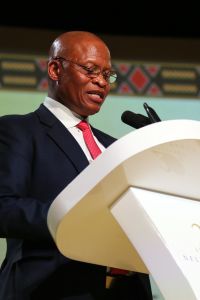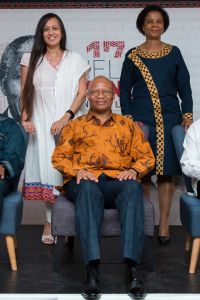On Saturday, 23 November 2019, the Nelson Mandela Foundation hosted the 17th Nelson Mandela Annual Lecture at the Soweto campus of the University of Johannesburg. Our speaker for this flagship event was Chief Justice Mogoeng Mogoeng. We asked of him what we always ask of our Nelson Mandela Annual Lecture speakers – namely, to use a given theme to stir audiences into action for social justice. He did that and more, drawing on the passion of a preacher and the vision of a prophet. The day before the Lecture, he had visited the Foundation to engage with Madiba’s personal archive and to participate in a dialogue with Professor Njabulo Ndebele and a group of Foundation stakeholders.
The theme we invited the Chief Justice to explore, on both occasions, was constitutionalism as an instrument of transformation. It is a theme which the Foundation has been wrestling with throughout 2019. We believe in constitutionalism, but we have become mindful of the fact that it can be, and has been, utilised as a sophisticated instrument for protecting power, privilege and property. How do we turn it, instead, into an instrument for deep and sustainable change? What do we mean by justice and equity in 2019 South Africa?
The Foundation has been reflecting deeply on the Chief Justice’s magisterial offering as he wrestled with these questions. In particular, we have looked for the lines of analysis and enquiry which we can take forward in our work and which promise to keep inspiring us in the challenging times which undoubtedly lie ahead. The first of seven we have identified is the conviction that South Africans need to learn to dream again. Repeatedly, the Chief Justice returned to the life and the words of Madiba as he evoked a vision for our country in the contexts of today. That vision is far removed from the iterations of a "rainbow nation" which dominated public discourse in the 1990s. It is the vision Madiba and his generation of leadership always had – a just society. We noted how the Chief Justice frequently quoted words from Madiba’s personal archive rather than from well-worn public texts, something that speaks to us of having to dig deeper in order to dream bigger.
The Chief Justice has often been criticised for speaking out in public on issues about which he feels passionate. This offends those who believe that judges should only speak publicly through their judgements. During the dialogue the day before the Lecture, he tackled this critique head-on, suggesting that the South African jurisdiction is not like those of countries which demand a separation between jurisprudence and ‘the political’. Constitutionalism demands a robust engagement with ‘the political’ at all levels of society. We would go further, and this is a second line of enquiry, by arguing that South Africa desperately needs public officials who are committed to justice, who see themselves as servants of the public, and who are activists in both orientation and practice. In our view, the Chief Justice exemplifies this.
And then five imperatives articulated by him as critical to transforming South African society and ensuring that Apartheid does not live on. Firstly, the question of land reform. It is time now for quick, decisive and effective action. Secondly, a resilient white supremacy must be combatted systemically and in relation to all its particular manifestations. Thirdly, any attempt to undermine the independence of the judiciary must be resisted. Fourth, South Africans must demand of those in authority, whether in government or in the private sector, whether in civil society or in communities, that they have a commensurate moral authority. And lastly, using all means provided by the Constitution, we must call out and pursue those who are looting our country, betraying Madiba’s dream, and destroying public trust. The ones the Chief Justice calls traitors. The ones whose greed has consumed them in obsessive accumulation of personal wealth and who are condemning South Africa to remaining one of the most unequal societies on earth.
There was a time in the 1990s when South Africans succumbed to the temptation to think of themselves as exceptional - we could fix things, in a decade, which other countries had taken generations to fix; we could implement, successfully, models from the global North which other countries in the global South had found unworkable in their contexts; we had little or nothing to learn from other countries on the continent; we could find reconciliation without redistribution; and so on. Well, two decades later, we’ve learned the hard way that we’re not exceptional and that we have much to learn, especially from the global South. But, while resisting exceptionalism, we must still strive to do exceptional things. At the dialogue before the Lecture, the Chief Justice argued that we South Africans have “allowed ourselves to be extreme in our wrongdoing.” It is time, now, to be extreme in doing right. It is time to turn constitutionalism into a tool for fundamental transformation.
On a personal note, I found refreshing the Chief Justice’s recurring call to take individual responsibility for transformation and a concomitant insistence that we should think not in terms of ‘us’ and ‘them’ but in terms of ‘we all’. We must go beyond a sense of righteousness and a performance of virtue. The challenges facing South Africa and the world are such that each one of us is going to have to step up. We must show up. To do so, the Chief Justice reminded us, we will have to draw, deeply, on the energies of love. We will have to commit to an exhortation of a justice to come (in his words, we need to pray). Moreover, we will need to embrace self-reflection. Always, we should look in the mirror before pointing fingers at others. As Madiba wrote in his Robben Island diary on the 17th of January 1977: “Gossiping about others is certainly a vice; a virtue when about oneself.”

